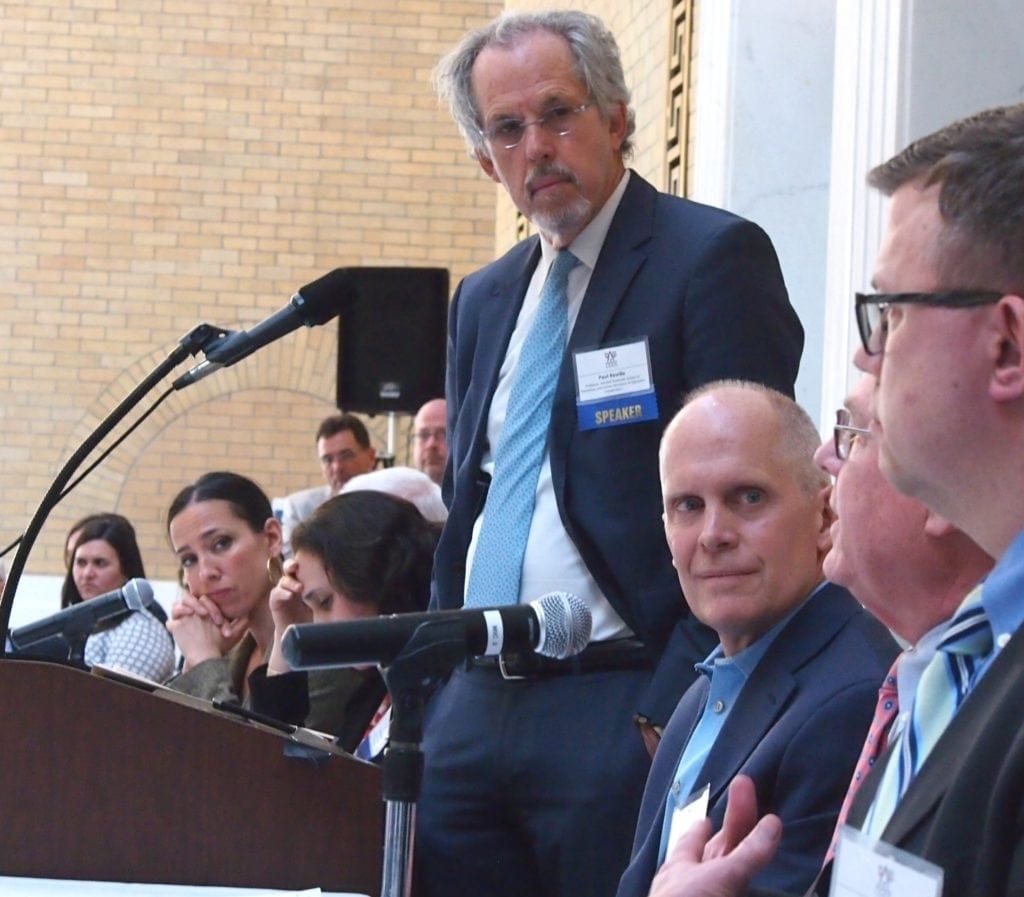Lawmakers fete 25 yrs of ed. reform
Teachers unions steer clear of event, call for more funding

State officials and education leaders gathered at the State House last Thursday to mark the 25 years since Massachusetts passed the 1993 Education Reform Act, which codified the so-called grand bargain of increased state funding for schools coupled with mandatory standardized testing.

Gov. Charlie Baker swears in Jeffrey Riley as Secretary of Education during the Leading the Nation event at the State House.
Among those present were Gov. Charlie Baker, Education Secretary James Peyser and newly appointed Commissioner of Education Jeffrey Riley. Absent were representatives of the state’s teachers’ unions, some of whom bowed out of the event in protest of what many see as state government’s unwillingness to keep up the funding end of the grand bargain.
“Twenty-five years ago it was a good idea to fully fund education,” said Massachusetts Teachers Association President Barbara Madeloni in a phone interview. “Now we’re not doing it.”
When the Education Reform Act was passed in 1993, legislative leaders widely recognized that there were vast disparities in education funding. That same year, the state’s Supreme Judicial Court ruled in the McDuffy v. the Secretary of Education case that the state’s underfunding of public education was in violation of the Massachusetts Constitution.
This year, legislators are not waiting for a lawsuit — although one may be in the offing. Local officials in Brockton and Worcester are gearing up to challenge the state’s current Chapter 70 funding formula, which critics say is chronically underfunding education in Massachusetts cities and towns. The Legislature’s Foundation Budget Review Commission found last year that Chapter 70 funding is underfunded by more than $2 billion a year.
While Baker’s version of the state budget this year marked a 4.3 percent increase over last year’s budget, he proposed an increase to Chapter 70 funding of just 2 percent, or $91 million — an amount education advocates say does not keep pace with rising costs. Baker’s budget also proposes cuts of more than $23 million in non-Chapter 70 funding, which includes programs like school lunches and child sexual abuse prevention.
State Sen. Sonia Chang-Diaz is sponsoring a bill that would gradually increase Chapter 70 funding over seven years with a $200 million increase in the first year. Chang Diaz’s bill (S. 223) has 82 co-sponsors in the House and Senate, including 10 Republican House members.
With no new broad-based tax increase in the budget to pay for increased funding, many are looking to the Fair Share Amendment, commonly referred to as the millionaire’s tax, which would raise the tax rate on income over $1 million. The measure is expected to appear on this year’s ballot in November.
Baker and Peyser have both been vocal in their opposition to the measure, which is opposed also by several Massachusetts business groups and the state’s Republican leadership.
Several speakers at Thursday’s event spoke about the revenue side of the “grand bargain.”
Former Senate President Thomas Birmingham noted that state spending on education has been flat since 2002, a dynamic that has affected low-income communities disproportionately. Birmingham said the state is not keeping up its end of the grand bargain.
Former Education Secretary David Driscoll was more pointed.
“We need to raise taxes,” he said. “We need to raise revenue. That’s evidently against the law in Massachusetts.”
The paucity of teachers and teacher’s union officials in the room was at times readily apparent. At one point Peyser lauded teachers and educators.
“Massachusetts schools are the best in the country because our educators are the best in the country,” he said. “It’s that simple.”
Yet, later in the program, when teachers were asked to stand, fewer than 10 in the audience of more than 200 stood.
Madeloni said her union is critical of the standardized testing regime mandated by the Education Reform Act.
“We know how destructive it is for our education system, particularly for children experiencing poverty and racial discrimination,” she said.
Riley, who was sworn into his new role as the state’s commissioner of the Department of Elementary and Secondary Education during the event, spoke about the importance working collaboratively to move education reform forward in Massachusetts.
“I truly believe that this will only be done by bringing all voices back to the table,” he said, urging charter and district school leaders to work together. “We are living in fragmented polarized times, but we must put down our partisan swords if we are to provide for our kids the best possible education.”
There appeared to be broad support at the event for charter schools, which were ushered in with the Education Reform Act of 1993, with many of the speakers representing parts of the charter movement. Peyser was a board member of Families for Excellent Schools, the now-defunct New York-based group that led the failed 2016 ballot question backing charter school expansion. He and Gov. Baker, who also spoke, were vocal supporters of the ballot measure. Keri Rodrigues, a former organizer for Families for Excellent Schools, was an invited panelist, but was not present at the event.







